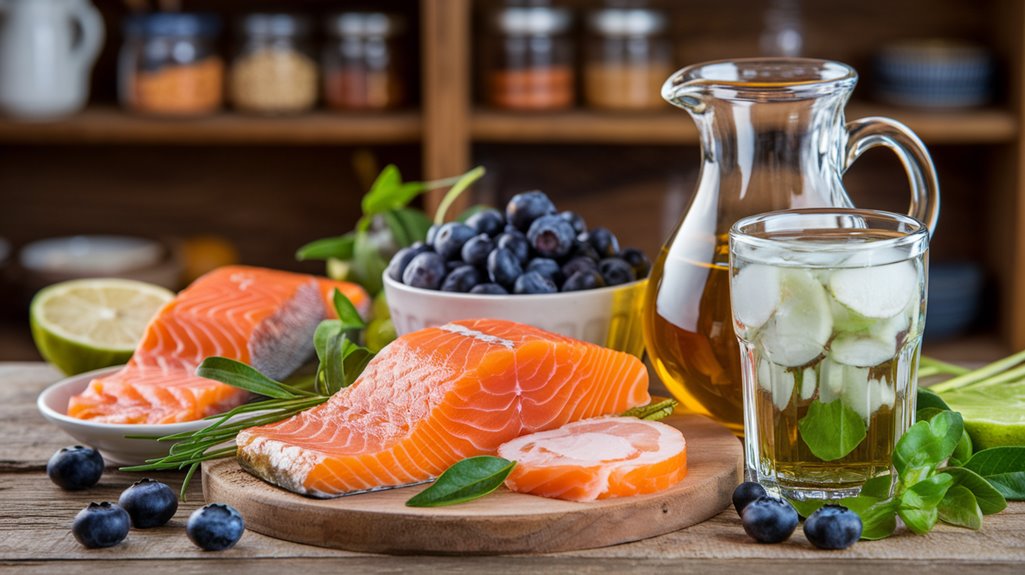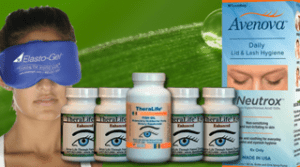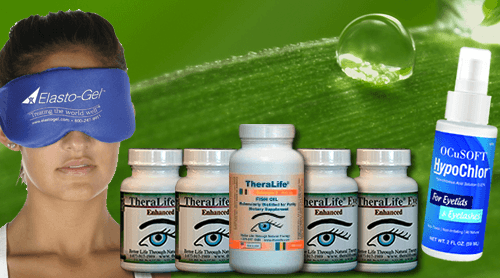To soothe dry eyes, consider TheraLife’s range of products designed to enhance eye comfort. Their solutions, such as those targeting blepharitis and uveitis, focus on improving tear quality and reducing inflammation. TheraLife’s products often incorporate natural ingredients that provide essential nutrients for eye health, akin to consuming omega-3 rich foods like salmon, flaxseeds, and walnuts. Additionally, incorporating products that support hydration and offer antioxidant benefits can further improve eye comfort. By choosing TheraLife’s offerings, customers can experience relief from dry eyes while potentially gaining other health benefits.
Powerful All Natural Oral Dry Eye Relief That Works
Add To Cart
Key Takeaways
- Consume omega-3 rich foods like salmon, flaxseeds, and walnuts to improve tear quality and reduce dry eye symptoms.
- Include vitamin E sources, such as almonds and sunflower seeds, to protect against oxidative damage and enhance tear function.
- Eat leafy greens and vegetables high in vitamin A, like spinach and carrots, for eye protection and reduced oxidative stress.
- Stay hydrated with 8-10 glasses of water daily and incorporate hydrating foods like watermelon and cucumber for better eye moisture.
- Limit processed foods and excessive caffeine to prevent inflammation and discomfort associated with dry eyes.
Omega-3 Rich Fish
Omega-3 rich fish are an essential component of a diet aimed at improving dry eye symptoms. These fish, including salmon, mackerel, and tuna, are excellent omega 3 sources, providing DHA and EPA—key fatty acids linked to eye health. Consuming these fish regularly can enhance meibomian gland function and reduce inflammation, contributing to the omega 3 benefits for your eyes. Studies suggest that eating cold-water and oily fish may alleviate symptoms of dry eyes by improving the oil layer of tears, which reduces evaporation. Research indicates that omega-3s may enhance meibomian gland function, improving tear composition and thereby easing dry eye symptoms. While some research shows varied results, incorporating these omega-3 sources into your diet remains a recommended approach for potentially reducing the need for artificial tears and supporting overall eye health. It’s important to note that omega-3 supplementation may not work for everyone, and consulting a healthcare provider is advised for personalized guidance.
Beneficial Seeds and Nuts
Incorporating seeds and nuts into your diet can be a strategic way to boost eye health. They offer essential omega-3 fatty acids and vitamin E, which are known to stabilize the tear film and protect against oxidative damage. Omega-3 fatty acids, in particular, have been shown to reduce dry eye risk by up to 17%. Adding zinc-rich options like sunflower seeds further supports overall eye function and can help alleviate symptoms of dry eyes. Additionally, improving tear production is crucial for maintaining eye moisture, and incorporating omega-rich foods can complement treatments like TheraLife Eye, which targets underactive tear production.
Omega-3 Fatty Acids
While many associate omega-3 fatty acids with fish, seeds and nuts also offer valuable sources that can aid in alleviating dry eyes. Omega-3 fatty acids may reduce symptoms of dry eyes, making them an important dietary consideration. As omega-3 sources, flaxseeds and chia seeds are rich in alpha-linolenic acid (ALA), supporting omega-3 metabolism. Although ALA has a low conversion rate to the more beneficial EPA and DHA, incorporating these seeds into your diet can still support eye health. Nuts like walnuts and cashews also provide ALA, making them excellent choices for dry eye relief. Omega-3 fatty acids found in these sources help thicken natural tears and prevent their evaporation, which is crucial for managing dry eye symptoms.
Consider adding the following to your diet:
- Flaxseeds: Sprinkle on yogurt or salads.
- Chia Seeds: Mix into smoothies or oatmeal.
- Walnuts: Snack on them raw.
- Cashews: Add to stir-fries.
- Brazil Nuts: Enjoy a few daily.
Vitamin E Benefits
Vitamin E plays an essential role in maintaining eye health by protecting against oxidative damage and supporting tear quality. Studies have shown that vitamin E can improve tear quality in individuals suffering from dry eye syndrome. To boost your vitamin E intake, consider incorporating seeds and nuts into your diet. Sunflower seeds and almonds each contain 11 IU of vitamin E per ounce, while hazelnuts provide 6.4 IU. These nutrient-rich foods not only enhance tear quality but also help reduce the risk of cataracts and age-related macular degeneration (AMD). Studies show that vitamin E, when combined with other nutrients, can lower the risk of advanced AMD by 25%. Additionally, cereals with wheat germ offer a significant source of vitamin E. Remember to avoid excessive intake, keeping below the safe upper limit of 1,500 IU to promote ideal eye health. In the U.S., about 16 million individuals experience dry eyes, highlighting the importance of incorporating nutrients like vitamin E into the diet for improved eye health.
#
Zinc for Eye Health
To further enhance your eye health, contemplate focusing on zinc-rich foods like certain seeds and nuts. Zinc is essential for maintaining the health of your retina and supports the production of melanin, which protects your eyes. Zinc deficiency has been linked to difficulty seeing at night, so incorporating foods rich in zinc into your diet can help support your vision and potentially slow the progression of age-related macular degeneration (AMD). Here are some tasty options to contemplate:
- Pumpkin Seeds: A powerhouse with 7.7 mg of zinc per 100g.
- Hemp Seeds: Versatile with 6 mg of zinc per 100g.
- Sesame Seeds: Offer 5.5 to 5.9 mg of zinc per 100g.
- Cashews: Provide 5.4 mg of zinc per 100g.
- Pine Nuts: Contain 6 to 6.9 mg of zinc per 100g.
Balancing these zinc benefits with other nutrients can promote overall eye health. For those experiencing autoimmune dry eye, products like TheraLife Autoimmune may offer additional relief by enhancing moisture levels naturally.
Leafy Greens Benefits
Leafy greens are a powerhouse of nutrients that greatly contribute to eye health, providing essential protection against dry eyes and other ocular issues. Lutein and zeaxanthin, antioxidants found in spinach and kale, help shield your eyes from oxidative damage. Omega-3s in these greens stabilize your tear film, reducing dry eye symptoms. By incorporating leafy greens into your diet, you enhance your eye protection naturally. Proper nutrition maintains healthy tear production, further supporting your eye health. Including a variety of leafy greens in your meals, such as in smoothies or salads, enhances hydration and improves tear quality, offering a natural remedy for dry eyes. Regular follow-ups with an eye doctor are essential for ongoing management of dry eye conditions, ensuring that dietary changes are complemented by professional eye care.
Vitamin A Vegetables
When it comes to combating dry eyes, vegetables rich in vitamin A are your allies. They’re effective vitamin A sources, playing a key role in dry eye prevention. Incorporating these vegetables into your diet can help maintain a healthy tear film and protect the cornea. A deficiency in vitamin A is a common cause of dry eye, emphasizing the need for these vegetables. Vitamin A not only supports tear production but also acts as a barrier against bacteria, protecting the cornea. Consider adding the following vitamin A-rich vegetables to your meals:
- Carrots: Known for their high beta-carotene content, which converts to vitamin A.
- Pumpkins: Packed with vitamin A, aiding in dry eye symptom relief.
- Spinach: Supports a healthy tear film.
- Sweet Potatoes: Rich in beta-carotene.
- Kale: Provides a substantial amount of vitamin A for eye health.
In addition to these vegetables, chronic dry eyes can be managed by exploring all-natural treatments that focus on internal health.
Citrus Fruits for Eyes
Although often overlooked, citrus fruits play an essential role in maintaining eye health. Citrus varieties like oranges, grapefruits, and lemons are packed with vitamin C and antioxidants, important for eye protection. These nutrients help maintain the connective tissue in your eyes, including collagen in the cornea, and combat sight loss conditions such as macular degeneration and cataracts. Flavonoids and carotenoids in citrus fruits further support eye health by protecting against oxidative stress. Regular consumption of citrus fruits has been linked to improved overall eye health, making them a beneficial addition to your diet. By incorporating these fruits into your diet, you can enjoy benefits like enhanced retinal function and reduced oxidative stress, which are significant for preventing dry eyes. Consider adding citrus fruits to salads, smoothies, or snacks to harness their eye-protective properties and promote overall eye wellness. Citrus fruits also help combat dry eye syndrome by supporting the tear film’s health, essential for preventing dryness and discomfort.
## Zinc for Eye Health
After exploring the benefits of citrus fruits for eye health, let’s focus on zinc, an important nutrient that plays a significant role in maintaining perfect vision.
Zinc is vital, particularly for the retina and macula, acting as an antioxidant to protect against oxidative damage. Missing out on zinc can lead to vision loss and other eye issues. Meeting your daily zinc needs through diet is essential. Strictly plant-based diets are associated with higher rates of zinc deficiency due to lower bioavailability, so it’s crucial to be mindful of zinc intake if following such a diet. Zinc also helps in reducing inflammation associated with eye conditions, which is crucial for maintaining optimal eye health.
Consider integrating the following zinc sources into your meals:
- Oysters and beef for a high-zinc boost
- Fortified breakfast cereals
- Lean meats like pork and poultry
- Seafood such as lobster
- Nuts and seeds, like cashews and pumpkin seeds
If needed, zinc supplements can also help maintain ideal eye health. Always consult with a healthcare provider before starting any new supplement regimen.
Hydration With Beverages
To maintain ideal eye health, it’s vital to focus on hydration sources that support tear production and overall ocular function. Drinking water is essential, but don’t overlook antioxidant-rich options like green tea, which can combat oxidative stress and inflammation. Additionally, beverages with electrolytes can enhance hydration efficiency, ensuring your eyes stay lubricated and comfortable. The Dry Eye Drink by Bruder offers a unique formulation that utilizes anti-inflammatory and hyper-hydrating ingredients specifically designed to address dry eye symptoms. Incorporating natural alternatives like TheraLife Eye capsules can restore natural tear production and improve overall eye comfort.
Essential Hydration Sources
When it comes to maintaining ideal eye health, staying well-hydrated is essential. Water plays a vital role in eye function by supporting the tear film and regulating fluid pressure, which can reduce the risk of conditions like glaucoma.
The hydration importance can’t be overstated, so aim for an ideal intake of 8-10 glasses of water daily. Unfortunately, most adults fall short, with men averaging 5.5 cups and women 5.375 cups per day.
To boost your hydration:
- Drink water regularly: Aim for the recommended daily intake.
- Include hydrating foods: Foods like watermelon and cucumbers help.
- Use electrolyte drinks: They enhance water absorption.
- Limit dehydrating beverages: Reduce caffeine and alcohol.
- Consider specialized drinks: Options like Dry Eye Drink by Bruder support eye health.
Antioxidant-Rich Beverages
While staying hydrated is fundamental for eye health, the type of beverage you choose can greatly impact your eyes.
Opt for antioxidant-rich drinks like green tea and fresh orange juice. Green tea is packed with antioxidants that protect your eyes from oxidative damage, while orange juice provides vitamin C, aiding in tear production.
Coconut water, with its electrolytes, enhances rapid absorption of water, benefiting the ocular surface. The Dry Eye Drink is another excellent choice; it offers 2-3 times more hydration than water, along with vitamins and anti-inflammatories to reduce ocular inflammation.
Incorporating these antioxidant benefits into your routine helps shield your eyes from irritation and supports overall eye health.
Tear Production Boosters
Even though you may already know the importance of staying hydrated, the specific beverages you choose can greatly influence tear production and alleviate dry eye symptoms.
Maintaining a proper hydration balance is vital for a stable tear film. Water is indispensable, so aim for at least 8 glasses daily. Additionally, evaluate caffeine, which studies suggest can boost tear production within hours.
Be mindful of alcohol, as it disrupts the tear film and leads to dehydration. For extra hydration support, try nutrient-rich options like green tea or coconut water.
Here are some tear production boosters to evaluate:
- Water: Essential for hydration balance.
- Caffeinated drinks: May stimulate tear production.
- Green tea: Antioxidant-rich.
- Coconut water: Invigorating hydration.
- Fresh orange juice: Offers vitamin C benefits.
Antioxidant-Rich Teas
Although often overlooked, antioxidant-rich teas are a powerful ally for maintaining eye health, particularly in combating dry eyes.
Teas like green, black, and white are packed with tea antioxidants such as lutein and zeaxanthin, which help protect your eyes from irritation and oxidative damage. These antioxidants counteract free radicals, reducing the risk of eye diseases and promoting hydration.
In particular, green tea’s catechins are effective at reducing eye inflammation, soothing symptoms of dry eye syndrome. Herbal teas like chamomile and rooibos also offer anti-inflammatory benefits that can calm irritated eyes.
Vitamin C Juices
Vitamin C juices are a potent ally in the fight against dry eyes, offering numerous benefits thanks to their rich antioxidant properties.
By reducing oxidative stress and inflammation, these juices improve tear film stability and conjunctival health. They’re effective in combating free radicals that can damage ocular tissues, enhancing overall eye health and alleviating dry eye symptoms.
Juicing benefits include easy incorporation of Vitamin C sources into your diet, such as citrus fruits, bell peppers, and strawberries.
Consider these Vitamin C sources for your next juice:
- Oranges: A classic choice for a revitalizing, eye-boosting drink.
- Lemons: Add a zesty twist to your juice.
- Bell Peppers: Surprisingly high in Vitamin C.
- Strawberries: Sweet and rich in nutrients.
- Broccoli: A unique but beneficial addition.
Caffeine and Eye Health
When considering caffeine’s impact on eye health, it’s essential to understand both its potential benefits and risks.
Caffeine effects, derived from sources like coffee and tea, can influence eye health by blocking adenosine receptors. This action may stimulate tear production, offering potential relief for dry eyes. Additionally, caffeine’s antioxidant properties could help protect against cataracts and wet age-related macular degeneration.
However, excessive caffeine intake might increase intraocular pressure and ocular blood flow, which could pose risks, especially for individuals with glaucoma predispositions. Consuming too much caffeine can also lead to eye discomfort and inflammation.
To balance benefits and risks, aim for moderate caffeine consumption, such as 1-2 cups of coffee daily, while considering personal health factors.
Powerful All Natural Oral Dry Eye Relief That Works
Add To Cart
Frequently Asked Questions
Are There Any Foods to Avoid That Exacerbate Dry Eyes?
You’re likely wondering which foods can exacerbate dry eyes. Experts advise avoiding spicy foods, as they may trigger inflammation.
Processed snacks, often high in sodium and unhealthy fats, can also lead to dehydration and inflammation, worsening dry eye symptoms.
Limiting these foods can help maintain better eye health. Balanced nutrition, including adequate hydration and reducing inflammatory foods, is essential for managing and soothing dry eye discomfort effectively.
How Does Alcohol Consumption Affect Eye Moisture?
Alcohol dehydration can dry your eyes faster than a desert wind! Consuming alcohol acts as a diuretic, increasing fluid loss and reducing eye lubrication.
This diuretic effect leads to unstable tear film and irritations. Alcohol also causes inflammation, disrupting the glands responsible for the eye’s oily layer, further compromising moisture.
To protect your eye health, drink water alongside alcohol and consider limiting intake according to expert guidelines.
Can Supplements Effectively Replace Dietary Sources for Eye Health?
You can’t rely solely on supplement sources to replace dietary sources for eye health.
Maintaining a dietary balance is vital. While supplements can support nutrient intake, whole foods provide a complex mix of vitamins and minerals essential for eye health.
Experts recommend prioritizing a balanced diet rich in nutrients like vitamins A, C, and E, omega-3s, and zinc.
Consult a healthcare professional before making changes to guarantee safety and effectiveness.
Are There Specific Meal Plans for Managing Dry Eyes?
Did you know that over 30 million Americans experience dry eyes?
Managing it involves strategic meal timing and hydration strategies. You need to focus on meals rich in omega-3s and antioxidants during the day, and always keep a water bottle handy.
Eating small, balanced meals every few hours helps maintain nutrient levels. Pairing foods like fish, leafy greens, and nuts with consistent hydration can greatly improve your eye health.
How Do Cooking Methods Impact the Nutrients for Eye Health?
You should focus on cooking techniques like steaming and stir-frying to optimize nutrient retention for eye health.
These methods preserve more lutein and vitamins compared to boiling or deep frying, which can strip away essential nutrients. Eating raw vegetables also guarantees no nutrient loss.
Use minimal oil for fat-soluble vitamins and avoid prolonged boiling to protect sensitive nutrients.
Powerful All Natural Oral Dry Eye Relief That Works
Add To Cart
Conclusion
Theralife.com offers a range of products designed to enhance eye comfort and health. Their natural supplements and remedies focus on alleviating conditions such as blepharitis, dry eyes, and uveitis. Theralife’s products, such as Eye Enhanced, target underlying causes of eye discomfort with anti-inflammatory and nutrient-rich formulas. They provide solutions for managing symptoms of Sjögren’s syndrome and support for those with recurrent chalazion or blepharitis. By integrating these products with a healthy diet and lifestyle, customers can experience significant improvements in eye health and comfort. Embrace Theralife’s expert-backed choices for happier, healthier eyes.





